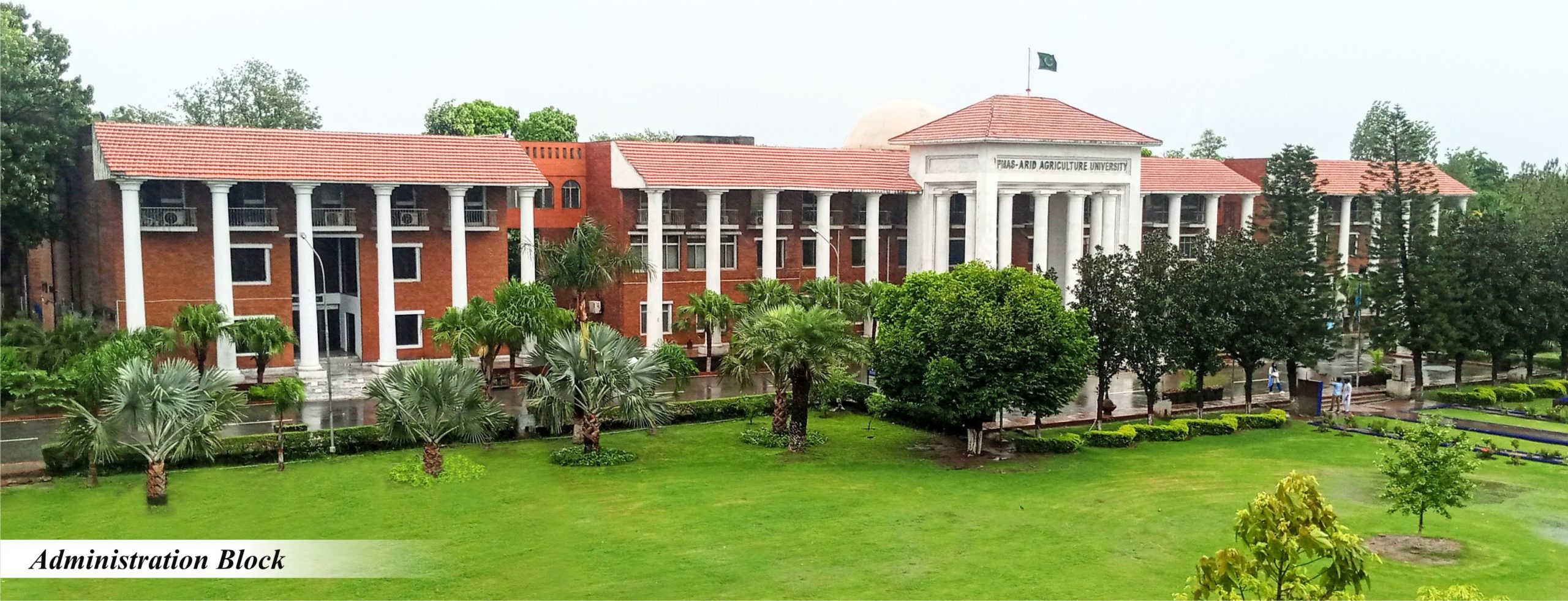
University Green Office
Introduction
University Green office has taken following initiative successfully to support PM’s clean and green Pakistan movement:
- Established a green office nursery at PMAS-AAUR
- Tree plantation campaigns at different sights (phase 1)
- Baned plastic bags in the university
- Awareness campaign for students, employees and local community about the segregation of waste, reuse and recycle of waste.
Green office has established a lush nursery where general public can purchase all kind of trees at a very nominal/govt. rate. Director Green Office, Mr Shahid Ali Khan appraised the greatest initative of Honorable Prime Minister regarding clean and green Pakistan movement and invites local community & general public to get plants from University green office nursery.
In addition to this university is also working with volunteers selected from the university and with many other organization to make the clean and green Pakistan movement a success.
Objective
Plan and take the necessary measures for implementation of green management and enhancement of the university based on environmental standards. Achieving the standards of “green university” on the national and international level
- Reduce the consumption of natural resources in offices of University.
- Planning and partnerships to achieve environmental goals. Strategic Planning and proper implementation of the university’s master plan in issues such as traffic management, energy and green buildings.
- Policy making for energy efficiency and use of clean and environmentally friendly technologies.
- Solid Waste Management with an emphasis on source sorting and reduction of waste production by declaring the campus “Zero solid waste campus”.
- Monitoring the activities of the various units of the University in order to follow principles of Green Management..
- Aligning environmental activities in different areas in order to prevent parallel tasks.
- Taking incentive policies for the participants in the Green Management of the University.
- Promoting the principles of environmental education at the university level and society.
- Engagement and participation in environmental policy and planning in twin cities of Rawalpindi & Islamabad.
- Encouraging and support of environmental NGOs (NGO) and environmental organizations in the University.
Major Steps Taken for Campus Sustainability
- Zero Solid Waste Campus Through Establishment of Integrated Waste Management Station.
- Establishment of On-Campus Rain Water Harvesting Pond at Main Campus and University Research Farm.
- An Indigenous Water Use Efficient Hydroponic System.
- Model University Research Farm.
- Annual Tree Plantation Campaign by the Students and Faculty.
Future Vision
- Intensive Tree Plantation
- Green Transportation
- Solarization of University by Using its Rooftops
- Energy efficient appliances usage in the University Offices
New Initiatives for the Green Campus
University Green office has taken following initiatives successfully to support PM’s clean and green Pakistan movement:
- Established a green office nursery at PMAS-AAUR.
- Plant for Pakistan Tree plantation campaigns to enhance tree cover at local level.
- Reducing GHG’s emission by banning transport and using smart/Environment friendly electrical appliances.
- Zero littering policy for the campus (Bio-Gas Plant).
- Banned plastic bags in the university.
- Introduction of Smart and green Building design while construction of new buildings.
- Introduction of new environment and sustainability courses in the curriculum.
- Introduction of organic farming and manuring.
- Initiation of soil less agriculture by introducing indigenous hydroponic structures.
- Establishment and operation of rain water harvesting model for Reusing of rain water.
- Paperless office working in the university.
- Awareness campaign for students, employees and local community about the segregation of waste, reuse and recycle of waste.
Community services of university
University Green office starts following community services for the benefit of local /surrounding community:
- Capacity building of farming community by conducting farmer days, farmer conventions, farmer training and awareness programs.
- Kitchen gardening techniques for urban women.
- Rural poultry program for rural women.
- Urban forestry.
- Veterinary clinical services for farmers and general public.
- Soil and water testing facility for farmers and local community.
- Bird’s aviary for local community.
- Introduction of digital and precision agriculture for better productivity in agriculture.
- Advisory service to farmers for increasing milk and meat production by applying breading and genetic techniques.
Plantation Drive 2021
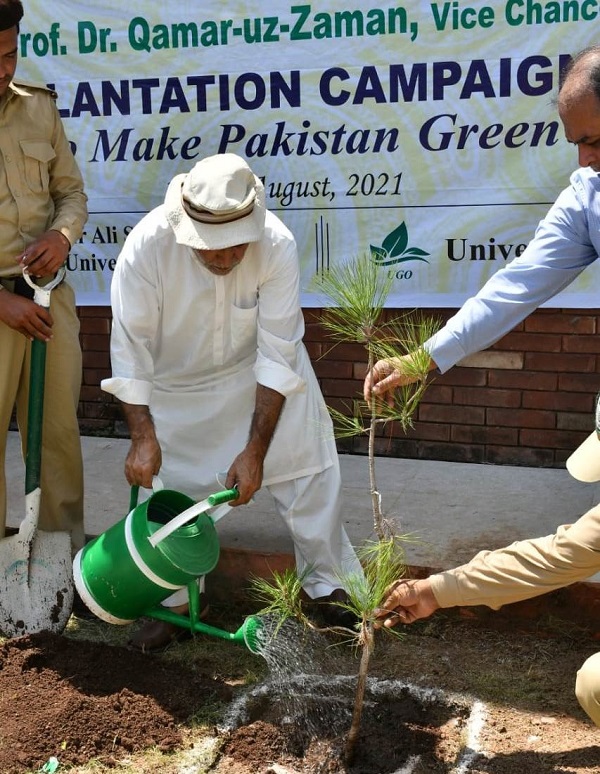
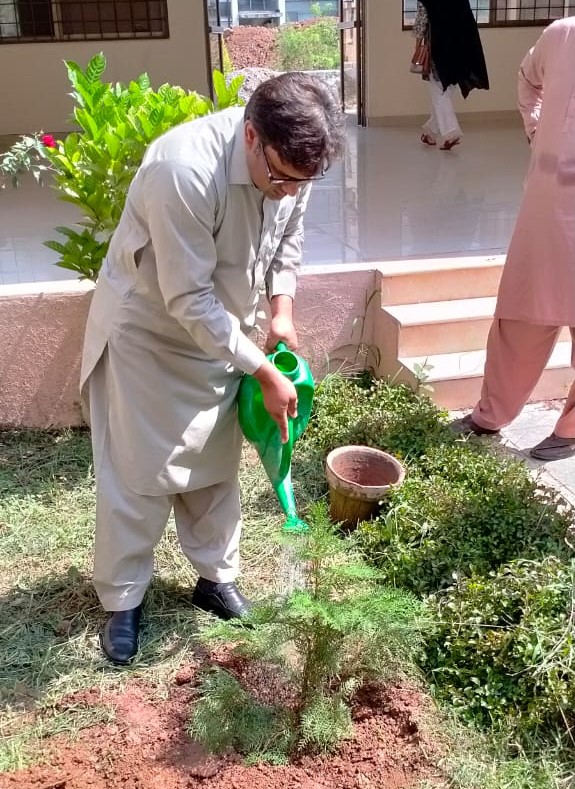
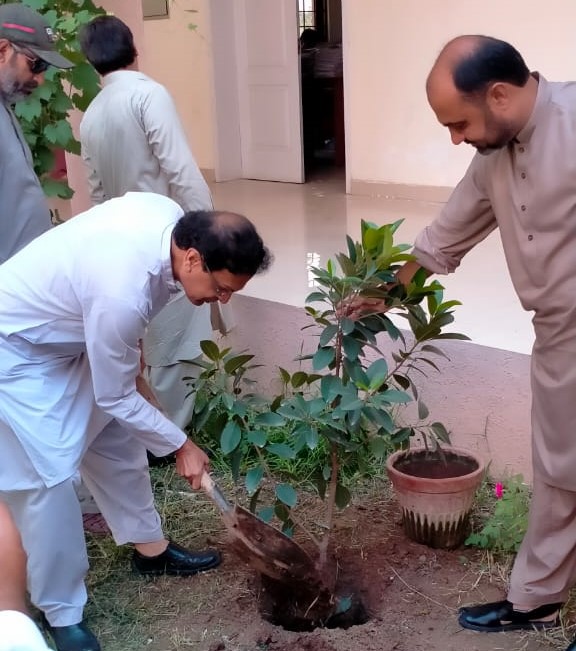
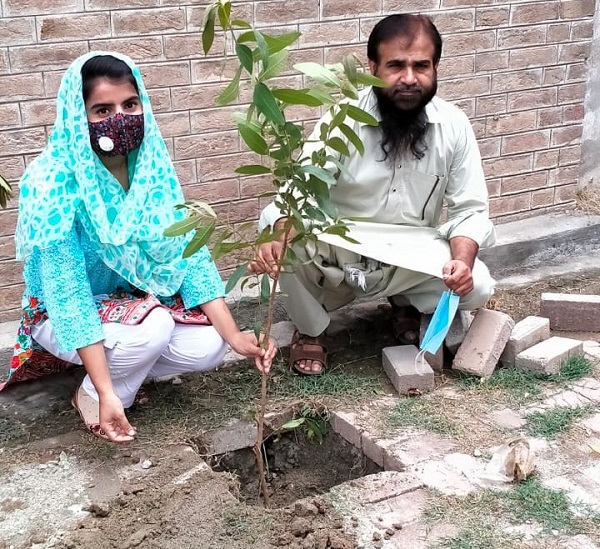
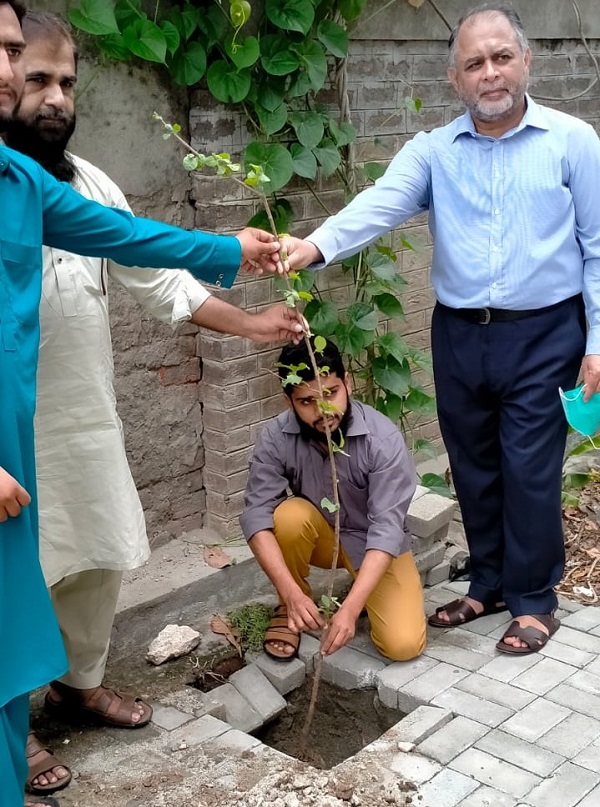
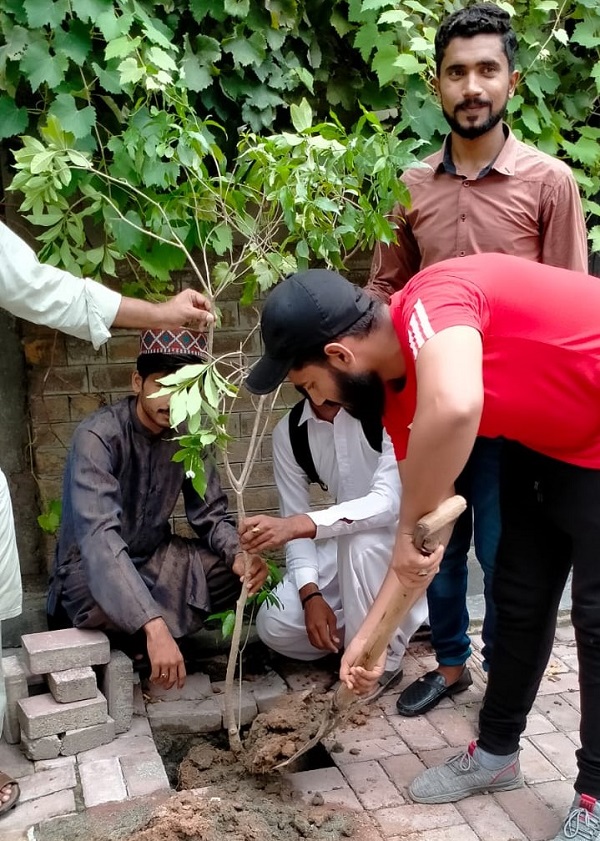
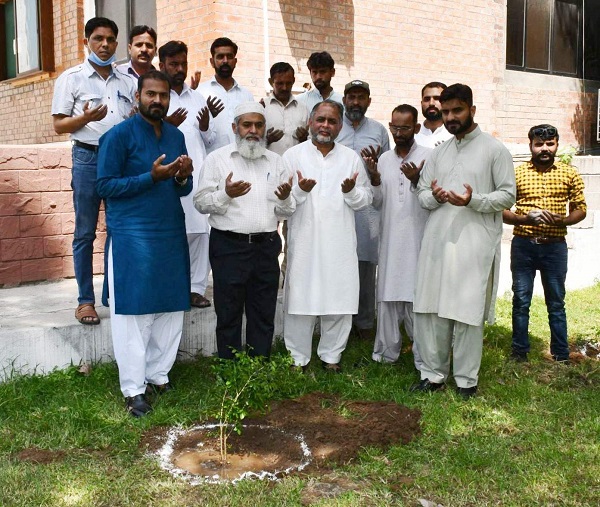
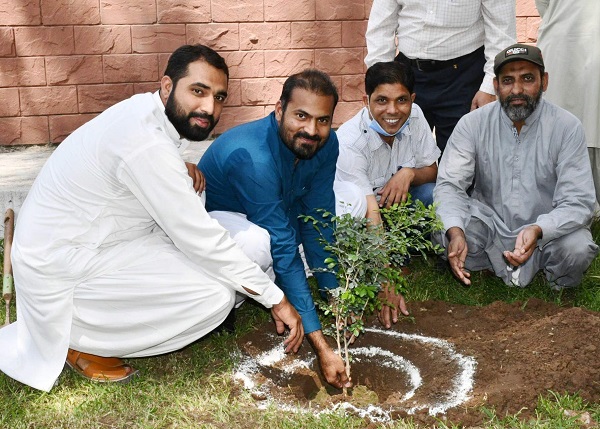
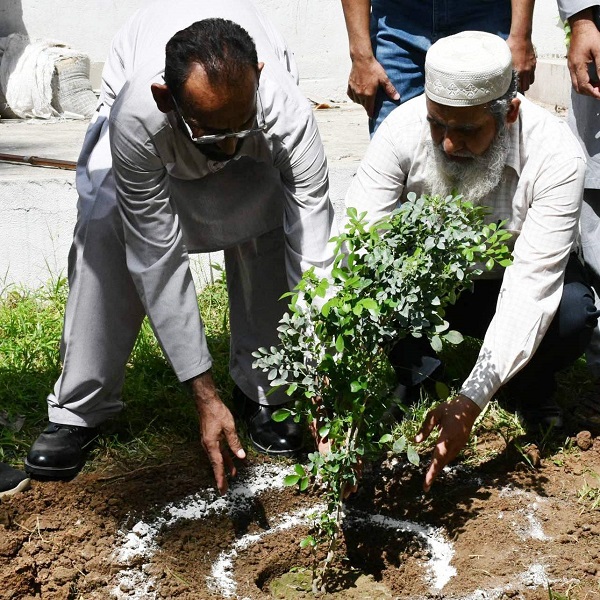
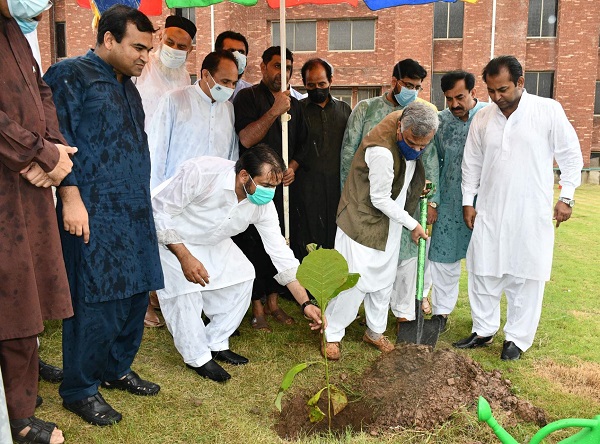
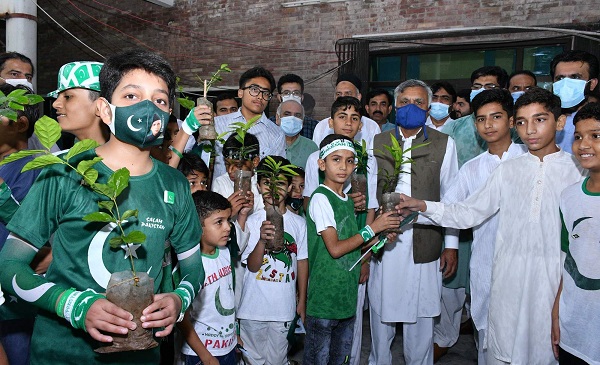
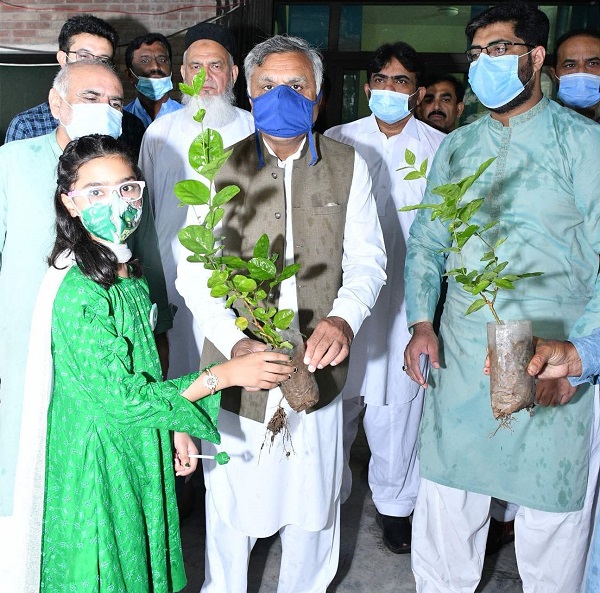
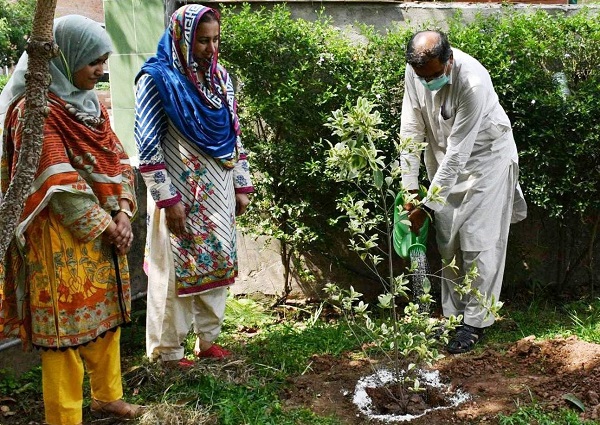
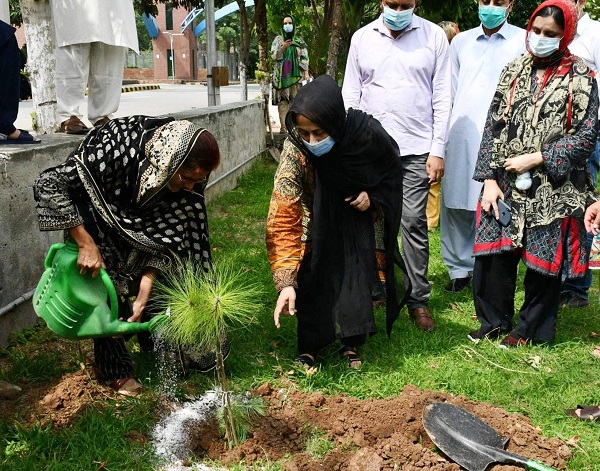
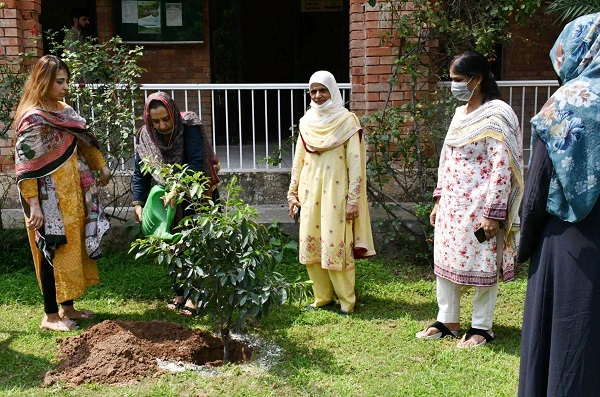
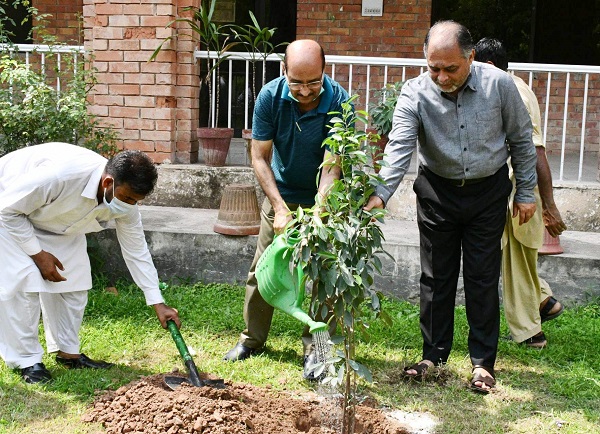
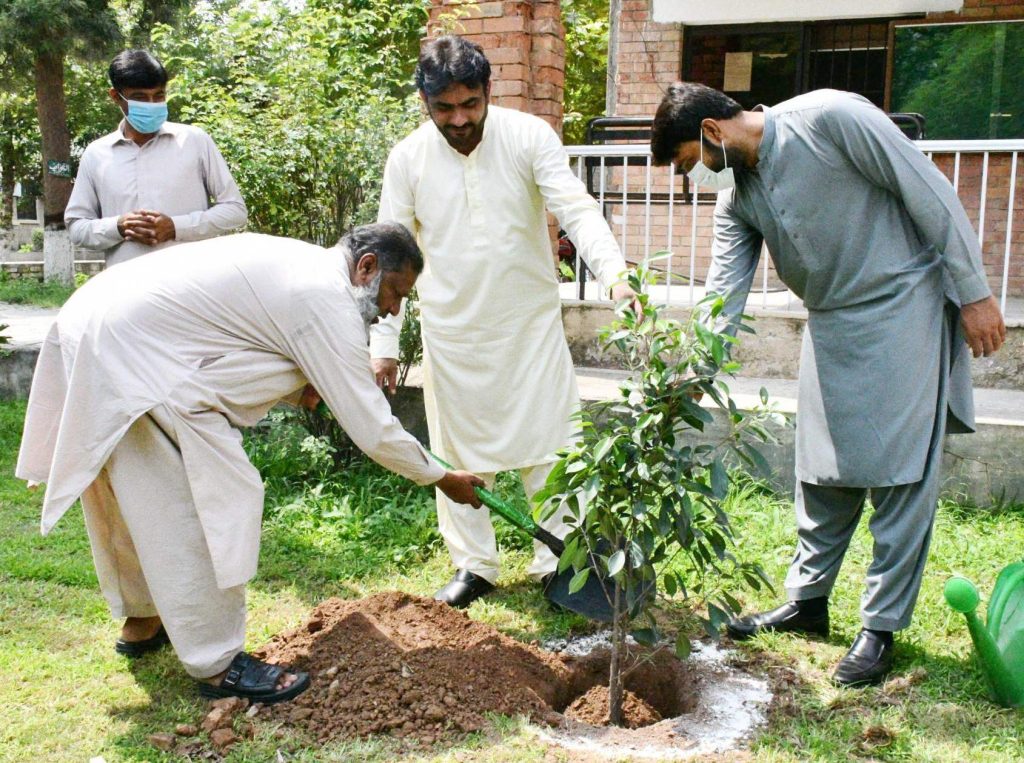
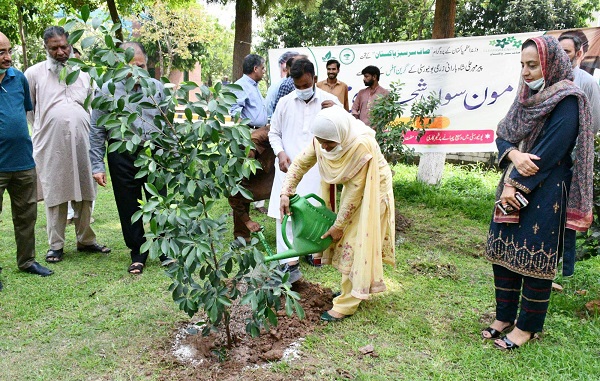
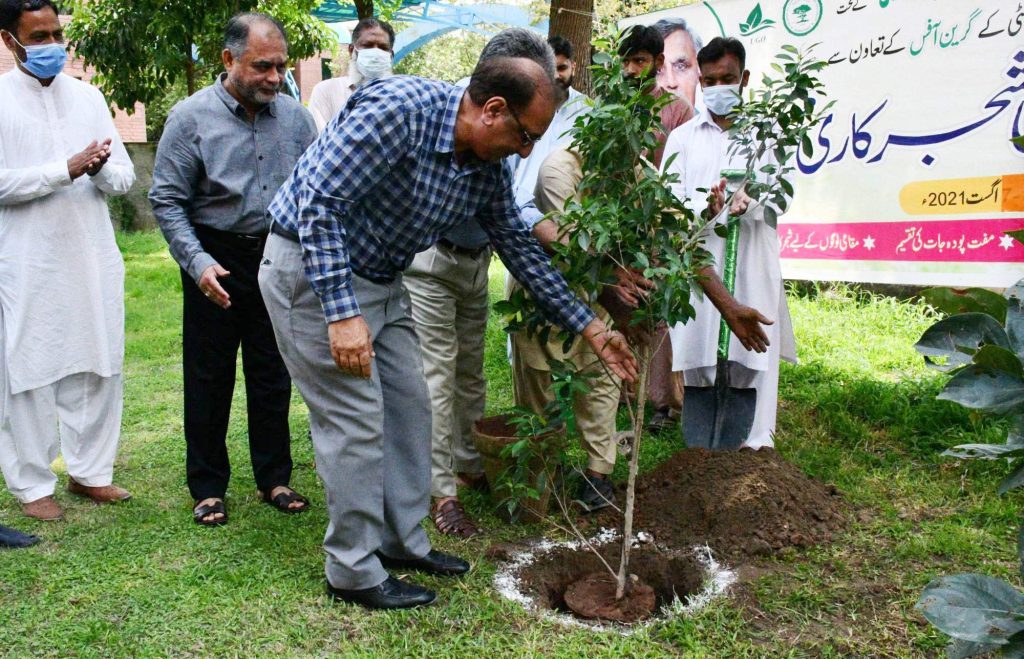
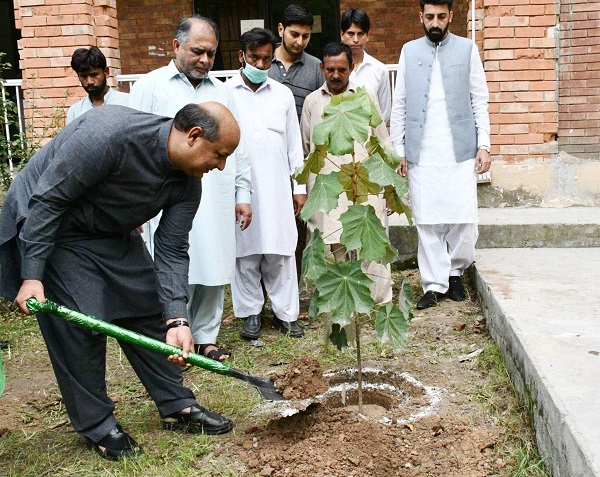
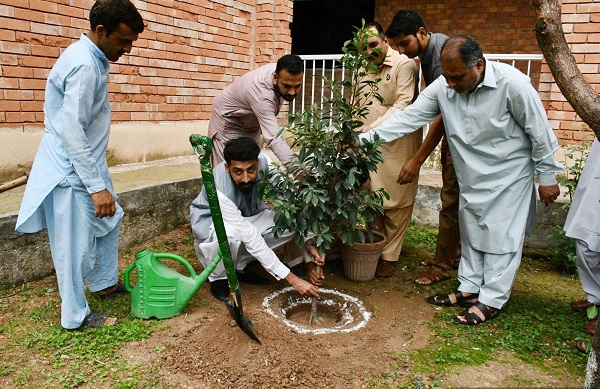
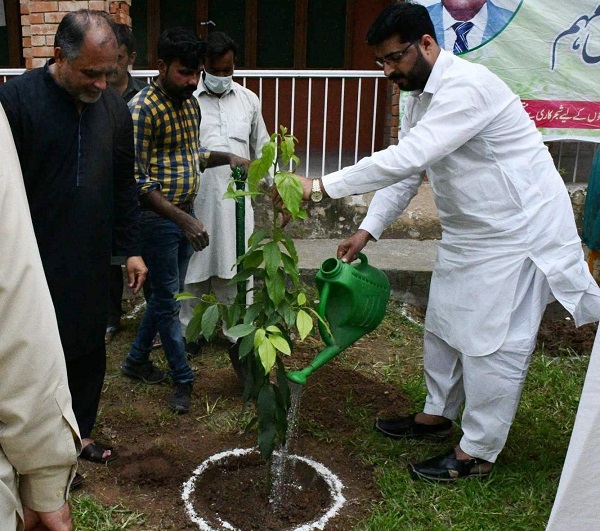
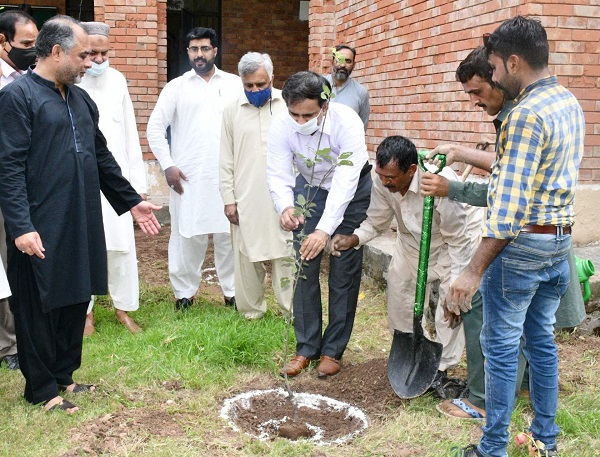
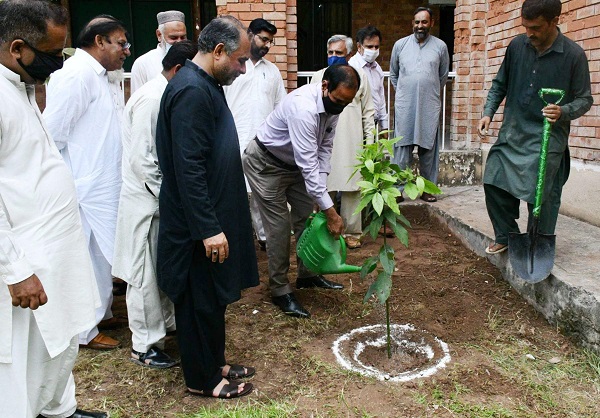
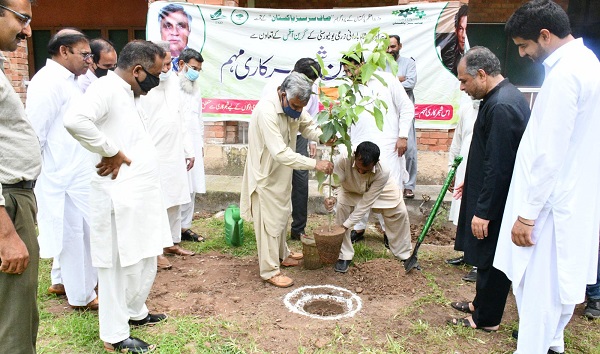
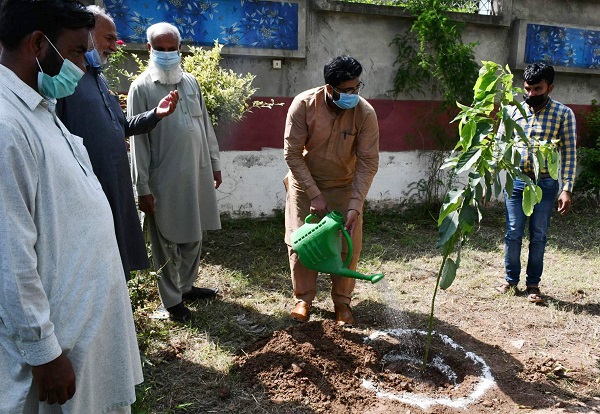
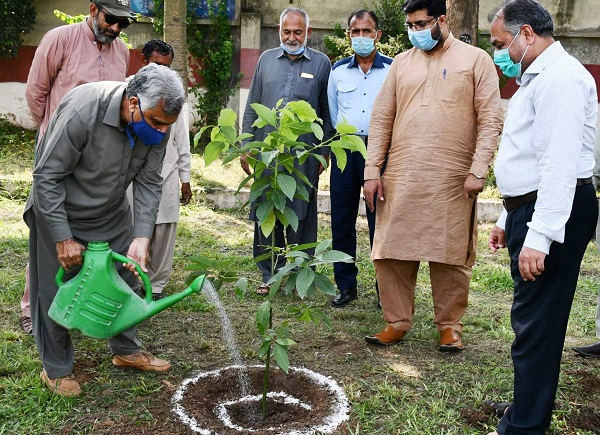
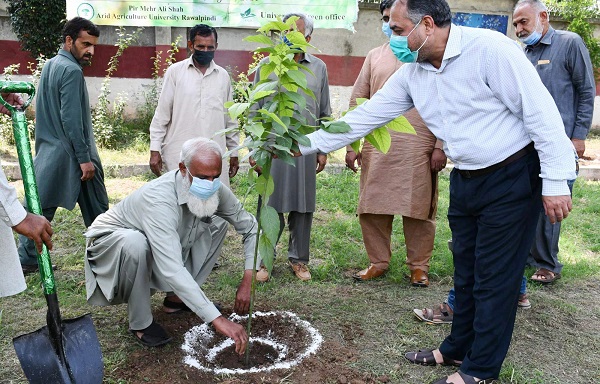
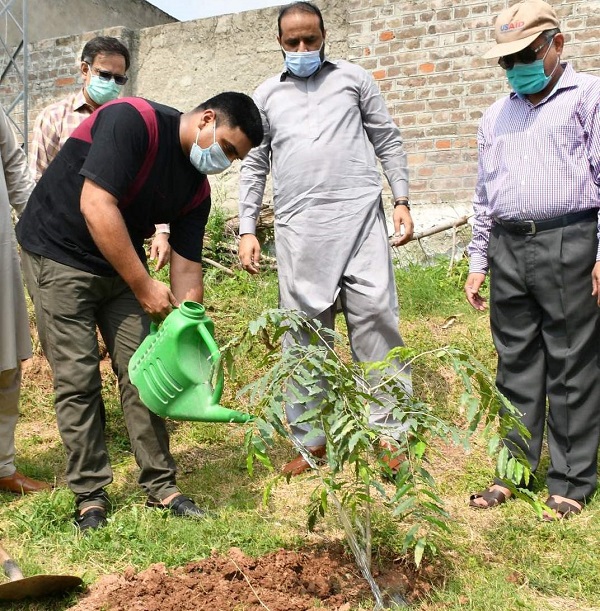
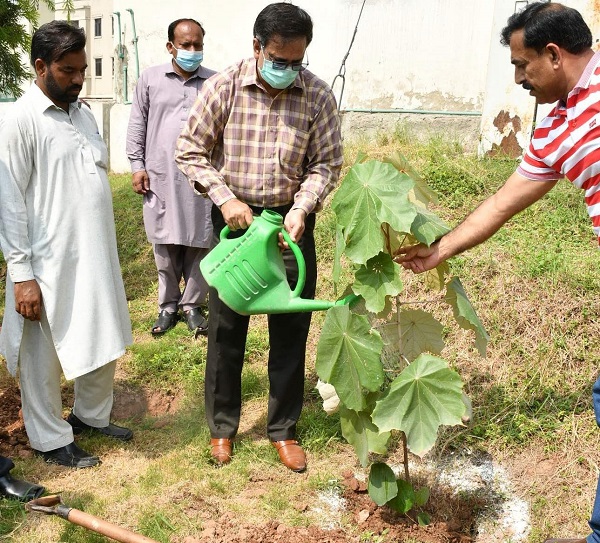
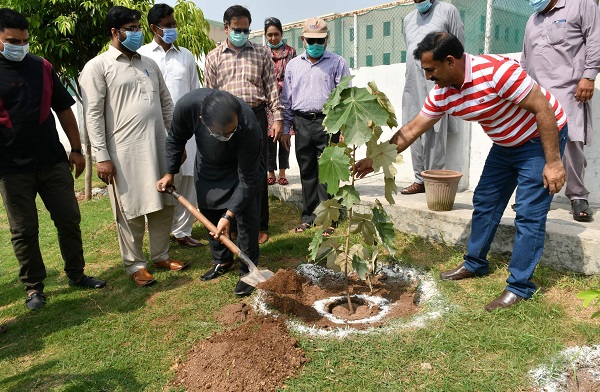
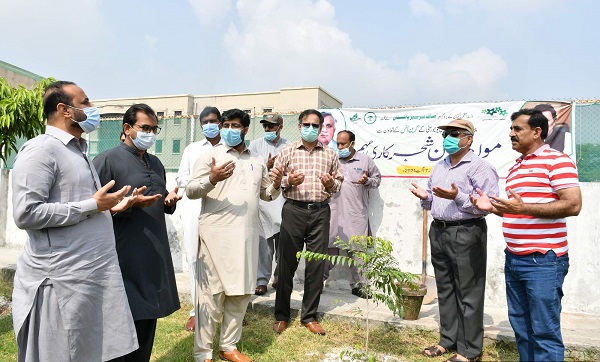
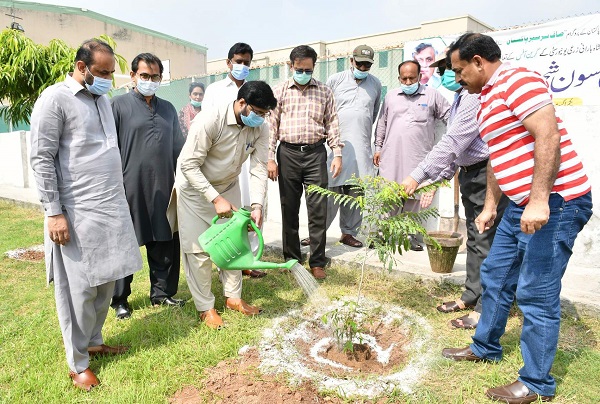
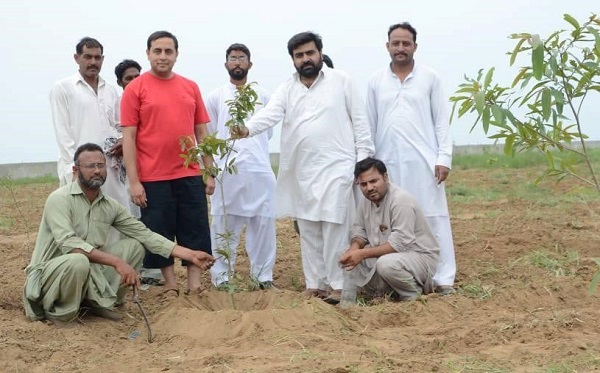
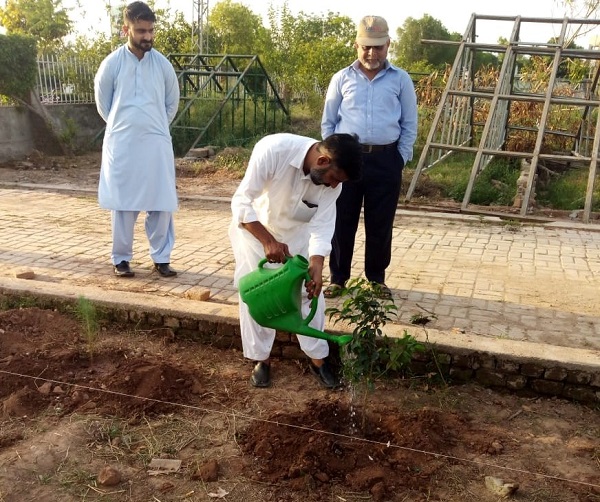
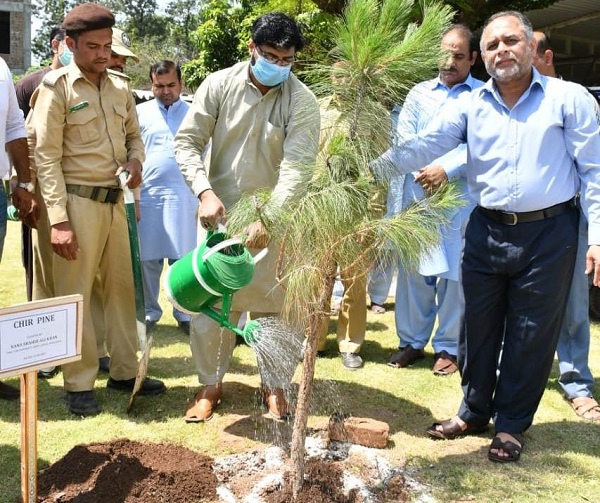
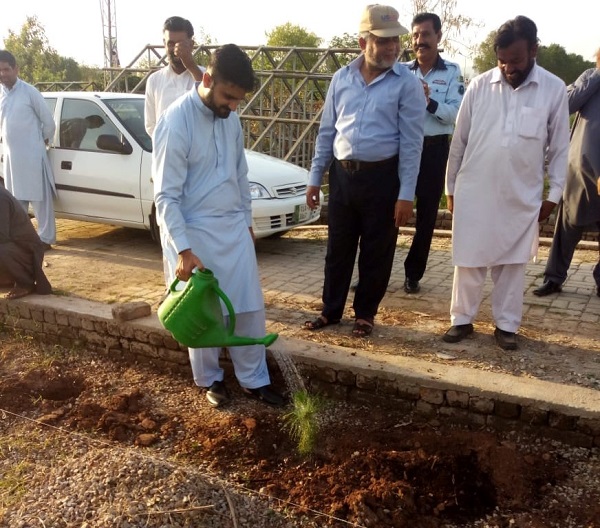
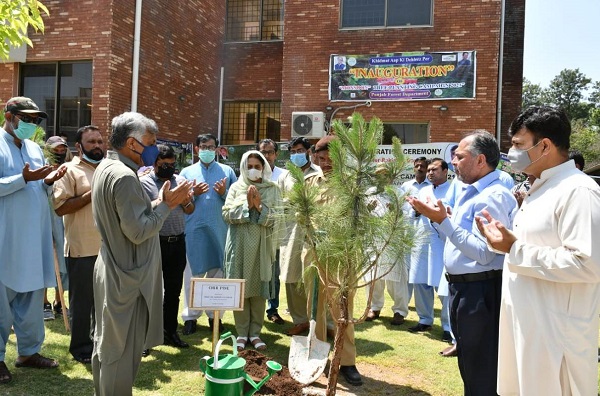
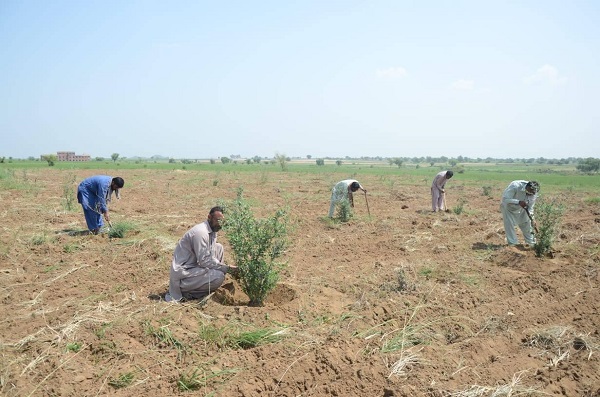
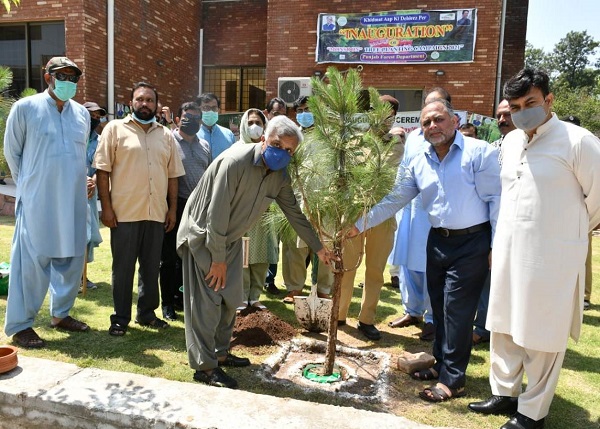
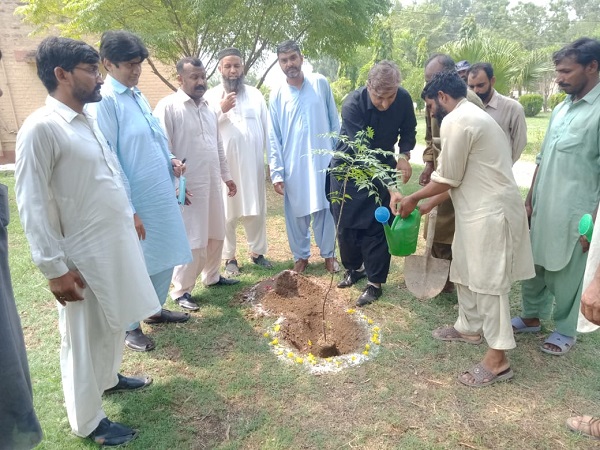
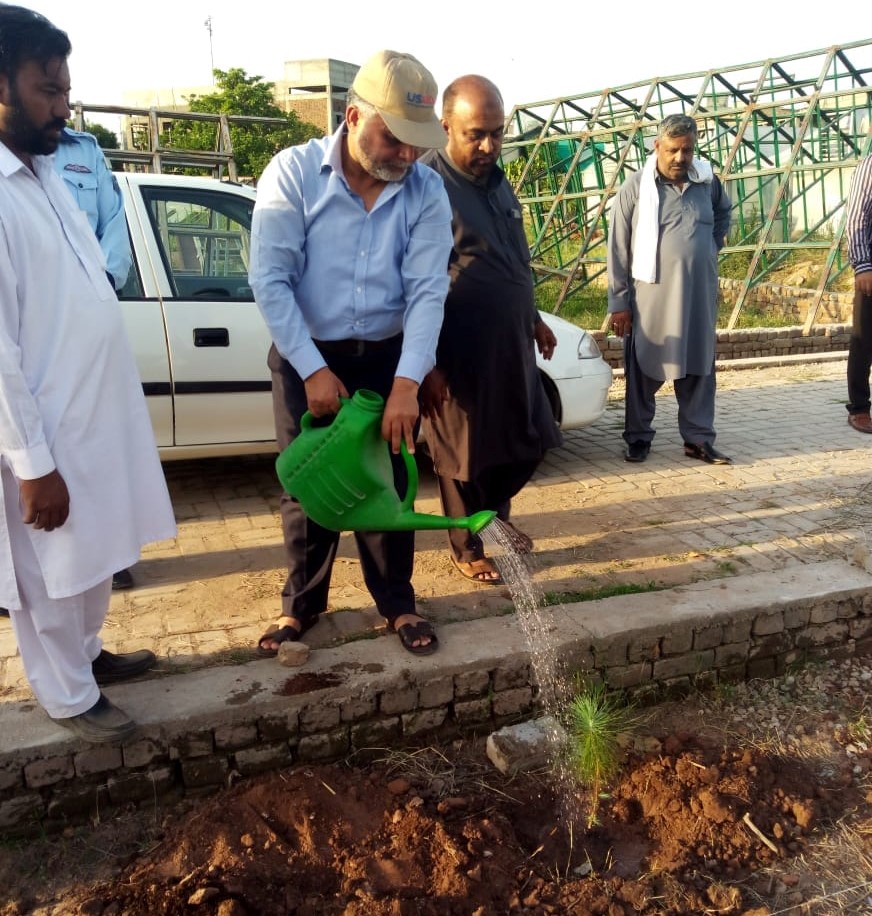
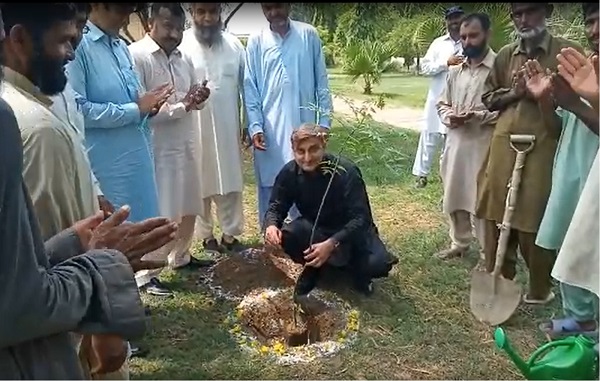
Sustainability and Green Campus Policy
| Department | University Green Office, PMAS-Arid Agriculture University, Rawalpindi |
| Author | The Director, University Green Office |
| Authorised By | The Vice Chancellor, PMAS-Arid Agriculture University, Rawalpindi |
| Implementation By | University Green Office, Estate Care Office, Directorate of Works, Deans, Directors, Departmental Heads, support staff and other users |
| Approval Forum | University Syndicate |
| Date of Approval | 10.07.2020 |
| Period of Approval | 36 Months |
| Implementation Date | December 2019 |
| Review Date | December 2022 |
INTRODUCTION
Pir Mehr Ali Shah Arid Agriculture University Rawalpindi (PMAS-AAUR) was established in 1994 as University of Arid Agriculture through the upgradation of Barani Agriculture College under the recommendations of Barani Commission Punjab. The mandate of the university is to produce high quality Agricultural Scientists and to form an organized scientific infrastructure for teaching and research for the development of dry land region of the country in general and Potohar in particular; thus minimizing the income gap between the rich and poor.
The University includes, Faculty of Crop and Food Sciences, Faculty of Sciences, Faculty of Social Sciences, Faculty of Forestry, Range Management & Wildlife, Faculty of Veterinary & Animal Sciences, Faculty of Agricultural Engineering & Technology, University Institute of Management Sciences (UIMS), University Institute of Information Technology (UIIT), Institute of Food & Nutritional Sciences, Institute of Geo-Information & Earth Observations, University Institute of Biochemistry & Biotechnology and Institute of Soil Science. The University building contains an auditorium, multi-storied administrative and academic blocks, a state of the art library, student hostels and a sports gymnasium. Currently, more than twelve thousand students are studying in the University.
PMAS-Arid Agriculture University Rawalpindi aims to lead, innovate and create the powerful partnerships needed to address the complex issues we face in the country regarding Agriculture. We are committed to understanding and transforming our environment, health and wellbeing – and the students and staff plays a vital part in that.
WASTE MANAGEMENT POLICY OF PMAS-AAUR
1. PURPOSE OF THE WASTE MANAGEMENT POLICY
The purpose of this policy is to set out the direction for developing sustainable waste management practices within the University in order to reduce the environmental impact of its operational activities and to make a positive contribution to the local environment. The policy also sets out the legislative framework within which the University must operate and recognises the environmental imperative that informs these legal obligations.
2. ORGANISATIONAL DEFINITION OF WASTE MANAGEMENT POLICY
Pir Mehr Ali Shah Arid Agriculture University Rawalpindi (PMAS-AAUR) aims to adopt a sustainable approach to waste management through the following application of the sustainable waste hierarchy:
- Prevention - avoidance, reduction and reuse
- Preparing for Reuse – recovery operations to prepare products or components for reuse
- Recycling – reprocessing of waste into products, materials or substances
- Other Recovery – anaerobic digestion and other processes which may produce energy from waste
- Disposal – any operation which is not recovery
3. EXISTING PRACTICES AT PMAS-ARID AGRICULTURE UNIVERSITY RAWALPINDI FOR ZERO SOLID WASTE CAMPUS
PMAS-Arid Agriculture University Rawalpindi with the help of technical and field staff, took the initiative for waste management at PMAS-Arid Agriculture University Rawalpindi to make it “Zero Solid Waste Campus”. For this purpose,” Integrated Waste Management Station” was established in the university. All types of wastes are collected daily and segregated into two categories, decomposable, and combustible wastes. These are processed separately to get useable products and energy.
Decomposable waste including plant, and grass, leaves etc are fermented in bio-digesters for a certain period, which start producing biogas on decomposition of wastes, while the compost “an organic fertilizer” is obtained at the end. On the other hand, combustible waste including paper, cardboard, wood and plastic are burned to heat the water and dry the food waste to use in poultry feed.
This station is also being used to create biogas and steam for the ultimate production of electricity to supplement the campus needs. The station of Arid Varsity serves as the model for education institutions, organizations and municipalities for making their surroundings clean and generating wealth from waste.
4. THE SCOPE OF THE POLICY
The Policy applies to all University officers, faculty, staff, students, contractors and visitors in so far as they can reasonably be expected to influence their actions and behaviour whilst on the premises.
5. RESPONSIBILITIES FOR DELIVERY
5.1. All Users
This policy establishes the principle that all users – officers, faculty, staff, students, contractors and visitors – have a responsibility to ensure it is adhered to and that any waste the University generates as a result of its activities is managed and ultimately disposed of in keeping with its principles, procedures and requirements. Although successful adherence to the requirements of the policy involves a positive contribution from all users, others also have specific responsibility in keeping with their roles.
5.2. Academic & Administrative Heads
Academic and Administrative Heads (Deans, Directors, Chairpersons and Principal Officers) should be responsible for ensuring that they and their staff, students, contractors and suppliers are aware of the need to effectively manage waste and that individuals have a responsibility to ensure the requirements of the Waste Management Policy are adhered to. Only through their support, PMAS Arid Agriculture University, Rawalpindi will be able to demonstrate a commitment to reducing its environmental impact.
It is expected that all PMAS-AAUR’s employees and students will understand the requirement to minimise the amount of waste produced within the University through implementing the following:
- Using electronic methods of communication and electronic storage of records rather than paper
- Re-use of paper for rough copies
- Double sided photocopying where possible
- Maximise container filling (don’t fill with fresh air, squash items instead)
- Reduce volumes of general, hazardous and toxic waste
- Reclaim or repair items when possible
- Use re-usable containers
5.3. Estate Care Office of the University
The Estate Care Office is to liaise with all academic and administrative departments regarding the type and volume of waste generated for each waste stream. Based on this information the concerned staff will assess the type and size of container required. This will also allow the Estate Care Office and University Green Office to assess whether any producer of harmful waste is carrying out the correct disposal procedures in accordance with current regulations and in accordance with safe disposal practices.
5.4. Contractors
All Contractors working in different sites of PMAS-Arid Agriculture University, Rawalpindi are required to provide a Risk Assessment and Method Statement, which confirms their responsibilities and procedures for the management and control of all waste generated as part of the work/contract. For development projects, the main contractor is also required to provide a site waste management plan. This may be a part of contract agreement between University and contractor in order to abide by the regulations strictly and with true letter & spirit.
5.5. Producers of Hazardous, Toxic and Inflammable Waste
Where hazardous, toxic, inflammable or similar waste is produced, the concerned incharge of the laboratory and staff must ensure that all such waste is stored in containers specifically designed for this purpose. Hazardous, toxic, and inflammable and other such waste may only be stored in designated areas. Waste containers are to be clearly labelled, sealed and secured in accordance with current University and legal requirements. Special arrangements are to be made for the storage and subsequent disposal of harmful, chemical, biological or clinical waste where applicable.
6. IMPLEMENTATION STRATEGY
6.1. Support and Advice
The Estate Care Department, in consultation with University Green Office and other appropriately qualified staff, will be responsible for co-ordinating the waste management requirements for the University with the aim of reducing waste and increasing recycling and reuse through the implementation of sound waste management procedures.
6.2. Procedures
The Estate Care Office will consider the following:
- General Waste: Identify measures to reduce the volume of general waste to minimise the amount of waste currently destined for landfill sites.
- Hazardous and Toxic Waste: Assess the requirements and appoint suitable qualified staff for the safe disposal of wastes defined as hazardous. These include – but are not limited to asbestos, toxic, corrosive, radioactive, flammable/ignitable, medical, sharps, clinical and sanitary, glass, liquid, gas and chemical waste.
- Recycling: Assess the requirements to substantially improve the segregation of materials suitable for recycling or composting when applicable. Arrange on-site disposal points for paper, cans, bottles and other recyclable waste and appoint suitable contractors for the collection and recycling.
- Monitoring and Recording of Data: Provide statistical information on the production and disposal of waste ensuring that records relating to the collection, transportation, handling and disposal of the waste are kept for a period of at least three years.
6.3. Apportionment of Costs
The Campus Management and Commercial Services Department, through the general Campus Services budget, will be responsible for the control and management of costs associated with the disposal of ‘routine’ waste streams:
- General
- Sanitary
- Food waste
- Recycled waste to include paper, cardboard, plastics, cans and bottles
- Confidential waste
Operational and Academic Departments that require specific management or disposal procedures beyond the scope of the above waste disposal programme will be expected to meet any additional associated costs from their own budgets. Appropriate arrangements will be identified, made, controlled and monitored by the Campus Management and Commercial Services Department and the originating department will be recharged as appropriate. This policy allows the Campus Management and Commercial Services Department to manage the service but it places the onus on the waste producer to limit the amount of waste produced to manageable levels.
The costs associated with the storage and disposal of hazardous, toxic, inflammable and other specialist waste will continue to be met by the waste producer.
6.4. Guidelines and Forms
Further information and guidance can be obtained from the University Green Office.
6.5. Communication Strategy
Raising awareness and encouraging the University community to support the Waste Management Policy will be fundamental to successful implementation. This will be achieved by:
- Raising awareness of the issues involved and requirements of the Policy. The policy will be available on the official website of the University.
- Issuing the policy to all contractors when appointed.
- Identify issues that need to be addressed through meetings with departmental heads.
- Identify any services that would support the requirements of the Policy and promote via the University’s website.
- Encourage and promote participation in recycling and other forms of waste management schemes
ENERGY AND WATER POLICY OF PMAS-AAUR
1. POLICY COMMITMENTS
This policy sets out the university’s commitment to energy and water reductions and how each and every individual plays a role in this.
2. THE UNIVERSITY’S SENIOR MANAGEMENT WILL
- Consider energy and water management in strategic decision
- Ensure suitable budget and resource is made available to deliver the energy and water management systems
- Empower staff and students to take responsibility for their impact on our carbon emissions
- Communicate relevant information in a timely manner across the universe to facilitate the delivery of the strategic objective of this policy
- Review and update the appropriateness, scope and ambition of energy and water reduction targets annually
3. EVERY INDIVIDUAL STAFF AND STUDENTS AT THE UNIVERSITY WILL
- Ensure they personally use energy and water as efficiently as possible
- Work together to achieve the challenging carbon reduction targets set out in the sustainability strategy
4. STRATEGIC OBJECTIVES
The university commits to the following objectives and practices.
4.1. Carbon Emissions
- Maintain an up-to-date carbon and water reduction plan; report publically; and share examples of good practice, for the benefits of students, industry and the wider community.
- Continually reduce absolute and relative energy and water consumption in line with the university carbon management plan and water management plan
- Maintain good systems for metering, monitoring and reporting energy and water use.
Recommeded Steps to Reduce Carbon Emission in the Campus
There are numerous steps/recommendations that could be used to reduce carbon emissions from the University. These are as under:
- Advanced Energy efficient and Environment friendly electrical appliances and IT Equipments should be used in all the offices of the University, due to that carbon emission can be decreased. Moreover, used or old electrical equipment should be banned that can also help to reduce urban emissions.
- Awareness programs of causes and effects of climate change should be lunched widely for future mitigation of carbon emissions.
- Chapters of sustainable development and its goals should be included in scheme of studies of all undergraduate and postgraduate degree programs.
- Turn off the lights when natural light is sufficient and when we leave the office.
- Many electronics and IT equipments continue using energy even when powered down i.e. Computer, printer, television, charger etc. Use a power strip to easily unplug these electronics when not in use.
- Print and copy on two sides, save single-sided pages for notes, and print only what we need.
- Power off the computers when we are away. A computer turned off uses at least 65% less energy than a computer left on or idles on a screen saver.
- The major source of Carbon Footprints in the University is movement of transport within the University, which escalate by the entering of vehicles in the University premises. Therefore, all types of vehicles may be limited to the parking areas only, except the Vehicle of Vice Chancellor and other VIP movements, in order to reduce the carbon footprints in the University.
- Plantation Campaigns in the University by involving the students and employees of the University
4.2. OPERATE AND MAINTAIN FOR ENERGY AND WATER EFFICIENCY
- Reduce demand/needs for energy and water consumption through behaviour change, space utilization, and passive design measures
- Maintain good working systems throughout the campus, reducing failure costs, and increasing longevity of the infrastructure
- Use smart controls to manage energy and water use
- Use efficient technologies e.g. low energy lighting, low flow water etc.
- Reduce/manage peak demands to reduce strain on the national supply network as well as the associated tariff charges
- Ensures low, or zero-carbon supply of energy and water e.g. on-site renewable, grey water harvesting
4.3. WHOLE LIFE PROJECT APPRAISAL
- Ensure whole life costs are taken into account to all estates management, design and equipment purchasing decisions
- All Business cases for large capital investment to take into account social and environment benefits of the project as well as the basic economics
4.4. ENERGY AND WATER PROCUREMENT
- To continue to procure energy and water at best value
- To continue to procure energy from renewable generation origins i.e. Solar Energy
4.5. AWARENESS TRAININGS/CAMPAIGNS
Awareness and motivation campaigns for staff and students will promote the benefits of saving energy and water and how to avoid waste. Campaigns will embrace financial, environmental and sustainability agendas. Training will be provided for key people who have a significant influence on controlling energy and water consumption.
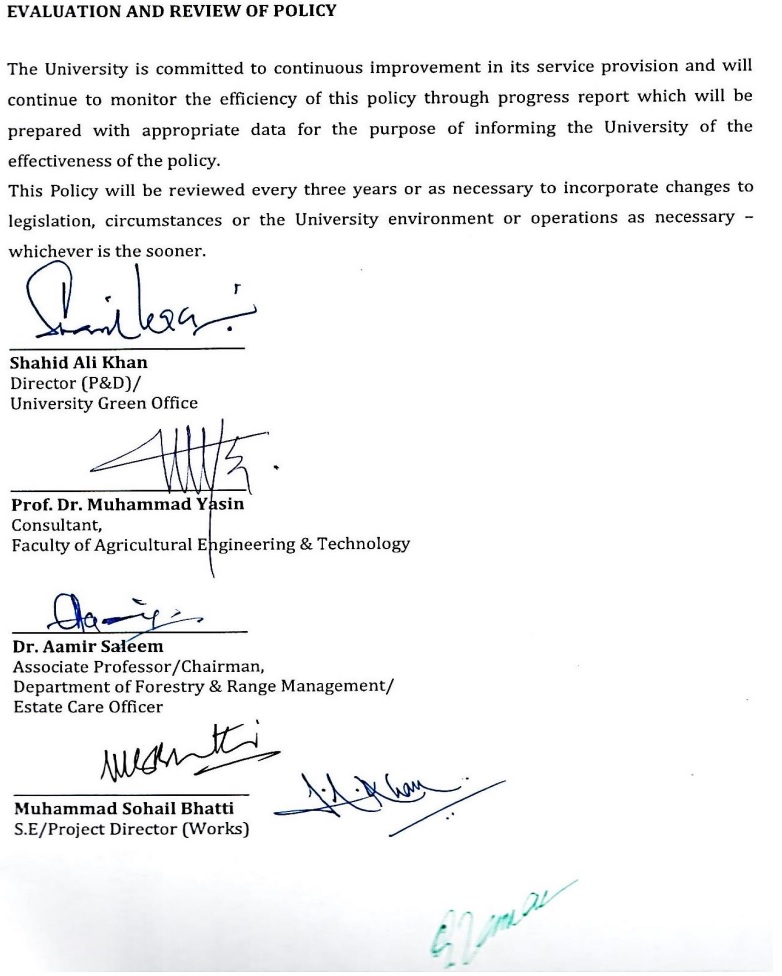
Sustainability Related Startups
1. Student Demonstration Plant Nursery
Under Green initiatives being envisioned by the Vice Chancellor, the students of Forestry and Environmental Sciences are encouraged to start their own nursery business by imparting training of the students about Nursery Raising Techniques, Kitchen Gardening Mechanism for female students and raising awareness among the local community by the student activities. For this purpose, every year 40,000 plants (forestry & horticulture) are raised by the students which are distributed free of cost to the local community during the two plantation campaigns of the country.

2. Honey Bee Project by the students - Mehr Fresh Honey of Phulai (acacia modesta) and Ber (Ziziphus mauritiana)
The students of the Entomology Department are actively engaged in the production of honey bee under this project. They are encouraged to participate in this activity for resource and income generation. The University is providing all logistic support to the students who are actively participated in this activity. The product thus obtained is sold among the faculty, student and other employees of the University on no-profit no-loss basis. The extra honey is sold out in the market to get the additional income.

3. Hydroponic Agriculture (21st Century Agriculture)
The Hydroponic technology for raising vegetables is becoming popular day by day and a source of manifold production of the vegetable as compared to the conventional agriculture although the energy cost may raise the cost of production in the prevailing situation of the country. However, the farmers trained in this trade at the University are taught to switch over their energy to the renewable energy i.e. solar energy in order to reduce the cost of the production. Resultantly, the faculty of the University has been successful to introduce the indigenous Hydroponic system affordable for the farmers and the students who got extensive training for the trade. The successful farmers by adopting the hydroponic technology may get manifold production of its produce whatever he want to produce. The undergraduate students of the university are obliged to learn the hydroponic techniques by introducing the subject of hydroponic technology compulsory. The University is aimed to train the students and the farmers of the region about this technology to make Pakistan Clean & Green.

4. Zero Solid Waste Campus/Green Campus
PMAS- Arid Agriculture University Rawalpindi has attained the status of “Zero Solid Waste Campus”. This became possible through the establishment of “Integrated Waste Management Station - IWMS” at PMAS-AAUR. The IWMS expands over an area of 1200 sq ft mostly under the fiber glass shed. Its main components are:
- An enclosure for temporary stock of collected biomass waste (plant leaves, paper, grasses and crop residues etc.)
- Anaerobic digesters, fermenter, biogas extraction and storage unit
- A generator to produce electricity from biogas.

The IWMS has been established with the main objective to beneficially utilize the waste biomass generated at the university campus for primarily making compost from it through anaerobic digestion process, and secondly to produce biogas from this processing and ultimately generate the electricity from biogas. This system was established under the Green Vision of the Vice Chancellor with the assistance of the University Green Office and Green Youth Movement Club of the Students. The members of the Green Youth Club are actively engaged in making the Campus Clean & Green by introducing integrated Waste Management Station and extensive Tree Plantation Campaigns thus raising tremendous awareness among the 14,000 students and 2,000 employees of the University in particular and thousands of the people living in the vicinity of the University.

5. Biogas Research Station
This is an innovative model of biomass utilization in an above-ground solid state process with the simultaneous output of bio-organic fertilizer (compost) and bio-energy. The model developed by the students and faculty is based on fermentation of slightly wetted waste biomass stacked only once in the anaerobic type digestion bins or pits and left covered with plastic sheet for six months to produce biogas and get composted towards the end. It needs only a little water sprinkling at the surface under the plastic sheet cover just fortnightly. Biogas synthesis starts immediately after closure / covering of digester accumulates enough biogas to be extracted for usage. It is drawn out through PVC filter pipes laid horizontally in the center of biomass digesters. In this way, the recently developed technology of integrated waste management is ideal for co-generation of compost, biogas and electricity without producing any waste to dispose of. There are simple procedural and material requirements for adopting this technology at community level. Further, it can also be propagated at larger scale to take care of solid waste being generated every day in the cities and agricultural crops residues in rural areas with the fruitful outcome to have organic foods and fulfill the energy needs. This has also opened up new avenues of research on biomass utilization and bio-energy production. By virtue of the above intervention by the students of the University, it is revealed that the human resource thus produce will be able to initiate its own business of fertilizer and energy & earned income lead to the successful entrepreneurship.

6. Food Processing and Research Laboratory
The Institute of Food & Nutritional Sciences is patronizing this student demonstration and research facility in the relevant field for furnishing new opportunities of product development for the students of the institute. The trained human resource in the form of food scientist, technologist and nutritionists will be part of the National Economy to meet the emerging food requirement of the masses of the country by value addition and other allied practices. The students of the institute are actively engaged in the research and demonstration of the food analysis and development of the food product along with the nutritional activities which make them a strong professional in the field of food and nutritional sciences. The products of this lab are sold within the University community for encouragement of the students.


7. Veterinary Advisory Services Rendered by the Students – Veterinary Medical Teaching Hospital
The Faculty of Veterinary and Animal Sciences with the assistance of the final year students started an advisory/consultation services for the ailing birds, sheep, dogs, goats and large animals of the area. The necessary surgical services are also being provided at the student work station.
The Veterinary Medical Teaching Hospital is established for local community service, tertiary care satellite hospital located at University Research Farm. The veterinary specialists of the University provide care for large and small animals including bovine, goats, sheep, horses, donkeys, camels, and deer etc. The primary objective of the veterinary teaching hospital is to impart teaching and training of undergraduate and postgraduate students enrolled in DVM, MPhil and PhD degree programs. In addition, it provides clinical services to the animal breeders and farmers. This hospital deals with medical, reproductive, surgical and pet cases. Apart from this, Doctor of Veterinary Medicines (DVM) undergraduate students have been visiting the hospital regularly during their enrolled clinical courses for hands-on-training. Immediate diagnosis and treatment of sick animals (infectious and non-infectious diseases), vaccination of birds and animals and organizing Farmer day at University Research Farm on yearly basis.
Livestock production and management department has a small and large ruminant farm, maintained at University Research Farm. The main objective of the livestock farm is to provide students with basic and applied knowledge for a strong foundation in livestock production sciences that emphasizes the application of fundamental principles of animal farm management, feeds & feeding and breeding and genetics in the areas of animal production.


8. Incubation Center
An Incubation Center established on July 2021 at University Institute of Information technology of PMAS-AAUR with an aim to promote entrepreneurship. The Incubation Centers are playing an important role and such a center is the need of time. The center will not only provide students a workplace by organizing training courses & workshops but also teach, guide and help students to formalize their projects.

9. Women Development Studies Center to Empower Rural Women/Students
Every Woman has the opportunity to earn a dignified livelihood. The establishment of this Women Development Studies Center (WDSC) is to increase opportunities for income generation among Women of Pothwar Plateau, by strengthening their skills, business capacities and market linkages, thereby facilitating them in accessing better economic opportunities and improving their quality of their life and that of their families. There is a dire need, to support the step of young university female graduates as an “entrepreneur” in to job creation and market. The establishment of this center in one of the pioneer effort is being made in the Rawalpindi or Pothwar region. This is the first formal step to strengthen the bond between education & entrepreneurship. Keeping in view the skills and ability of self-generating income activities of the Pothwar women, this center aims at empowering the existing women’s business skills and as well as equipping with desired entrepreneurial market-based skills to the womenfolk. This center will prove a milestone in identifying skillful and vocational women (educated & uneducated) in order to recognize their true role in the economic development of Pakistan.
10. Research Endowment Fund Program
PMAS-Arid Agriculture University, Rawalpindi has setup Research Endowment Fund in order to promote Research, Development & Disseminate new technologies and capacity building through trainings in the field of agriculture and allied sciences. Different initiatives/programs have been designed under the umbrella of Research Endowment Fund to accelerate the research activities in the university. The objectives of the program are:
- Promotion of Research
- Developing New Technologies
- Dissemination of Technologies
- Training required for the development of Agriculture in the country
Moreover, following initiatives have been design under the umbrella of Research Endowment Funds:-
- Research/Performance Awards
- Funding for Workshops/Symposia/Seminars
- Publication Incentives
- Book Writing Incentives
- Research Grant for PhD Students
- Funding for Travel grant
- unding for Outreach Activities
- Reimbursement of Patent Filing
11. Outreach Activities For Rural Farming Community
University outreach program strengthened the link between university and the farmers of Pothwar region. Outcomes of last year’s comprehensive outreach program attracted farmers to actively participate in it. During the Rabi season 2021-2022 program was launched on relatively larger scale with emphasizing on increasing per acre yield of three major crops of barani areas i.e wheat, chickpea and brassica. For field demonstration, progressive farmers were selected and new certified varieties of wheat (Fakhar-e-Bakkar), brassica (Barani canola), chickpea (Bittel 2016) were sown in farmer’s fields in rainfed areas of district Rawalpindi and vegetable seed kits for kitchen gardening were also distributed through balloting. Farmers’ gatherings were organized pre and post sowing of Rabi crops. In these meetings, farmers were comprehensively briefed about the latest production technologies of Rabi crops and their problems were addressed on the spot by field specialists i.e. Faculty and students.


